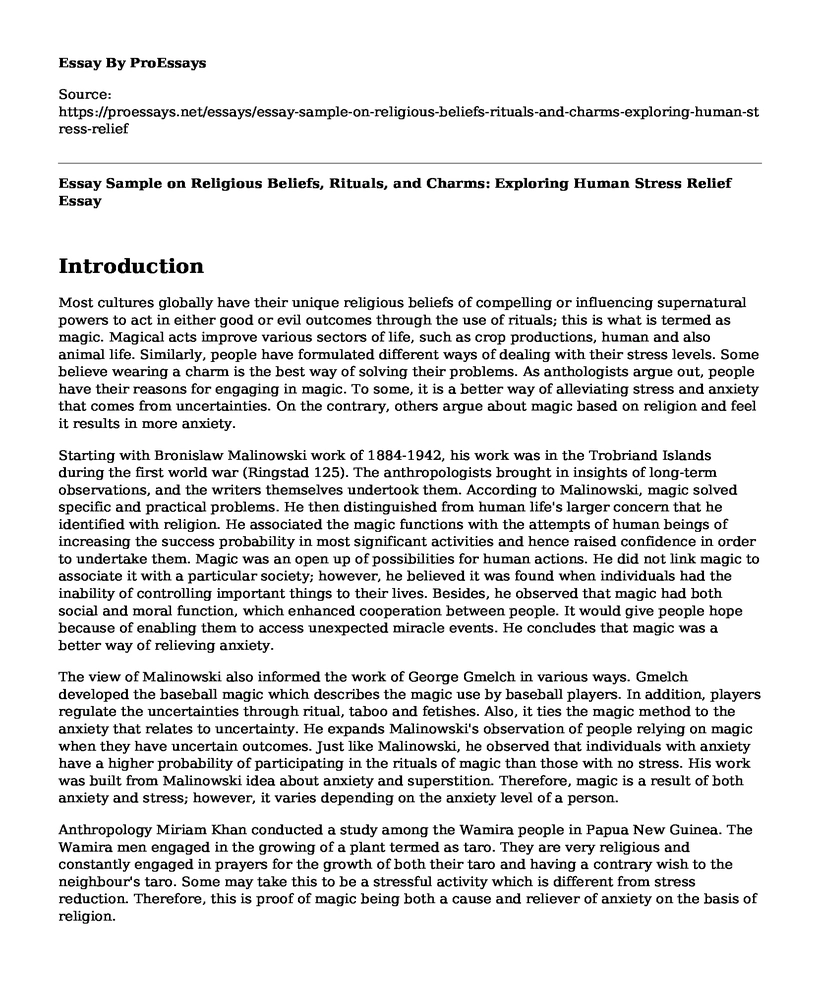Introduction
Most cultures globally have their unique religious beliefs of compelling or influencing supernatural powers to act in either good or evil outcomes through the use of rituals; this is what is termed as magic. Magical acts improve various sectors of life, such as crop productions, human and also animal life. Similarly, people have formulated different ways of dealing with their stress levels. Some believe wearing a charm is the best way of solving their problems. As anthologists argue out, people have their reasons for engaging in magic. To some, it is a better way of alleviating stress and anxiety that comes from uncertainties. On the contrary, others argue about magic based on religion and feel it results in more anxiety.
Starting with Bronislaw Malinowski work of 1884-1942, his work was in the Trobriand Islands during the first world war (Ringstad 125). The anthropologists brought in insights of long-term observations, and the writers themselves undertook them. According to Malinowski, magic solved specific and practical problems. He then distinguished from human life's larger concern that he identified with religion. He associated the magic functions with the attempts of human beings of increasing the success probability in most significant activities and hence raised confidence in order to undertake them. Magic was an open up of possibilities for human actions. He did not link magic to associate it with a particular society; however, he believed it was found when individuals had the inability of controlling important things to their lives. Besides, he observed that magic had both social and moral function, which enhanced cooperation between people. It would give people hope because of enabling them to access unexpected miracle events. He concludes that magic was a better way of relieving anxiety.
The view of Malinowski also informed the work of George Gmelch in various ways. Gmelch developed the baseball magic which describes the magic use by baseball players. In addition, players regulate the uncertainties through ritual, taboo and fetishes. Also, it ties the magic method to the anxiety that relates to uncertainty. He expands Malinowski's observation of people relying on magic when they have uncertain outcomes. Just like Malinowski, he observed that individuals with anxiety have a higher probability of participating in the rituals of magic than those with no stress. His work was built from Malinowski idea about anxiety and superstition. Therefore, magic is a result of both anxiety and stress; however, it varies depending on the anxiety level of a person.
Anthropology Miriam Khan conducted a study among the Wamira people in Papua New Guinea. The Wamira men engaged in the growing of a plant termed as taro. They are very religious and constantly engaged in prayers for the growth of both their taro and having a contrary wish to the neighbour's taro. Some may take this to be a stressful activity which is different from stress reduction. Therefore, this is proof of magic being both a cause and reliever of anxiety on the basis of religion.
Conclusion
In conclusion, it is not easy to coordinate religion and magic. It is evident that there is the existence of different definitions of magic according to various anthropologists. Religion has seen to have a direct relationship with anxiety. Similarly, magic has been used as a tool for solving different problems within society, especially the ones that associate with stress. Indeed, it is stress and anxiety reliever.
Work Cited
Ringstad, Jan Marius Bjornebo. By the old gods and the new: A study of magic and religion in Game of Thrones. MS thesis. The University of Bergen, 2018.
Cite this page
Essay Sample on Religious Beliefs, Rituals, and Charms: Exploring Human Stress Relief. (2023, Apr 23). Retrieved from https://proessays.net/essays/essay-sample-on-religious-beliefs-rituals-and-charms-exploring-human-stress-relief
If you are the original author of this essay and no longer wish to have it published on the ProEssays website, please click below to request its removal:
- Christian Faith: Case Study
- Christianity and Islam Compare and Contrast Essay
- Teleological Argument for the Existence of God Essay
- Essay Sample on Constantine's Contributions to Christianity and Its Impact Today
- Essay Example on Deborah Saves Israel: The Story of Ehud's Passing
- Historical Books of Israelites: Narrating the Past to Explain the Present - Essay Sample
- Essay on Exploring the Concept of Worldview: From Christian to Non-Christian Perspectives







